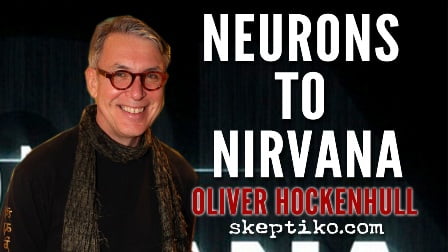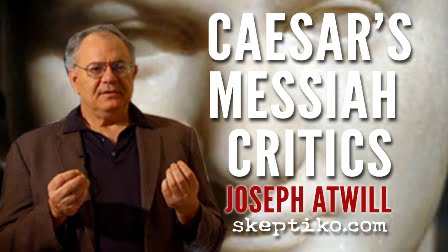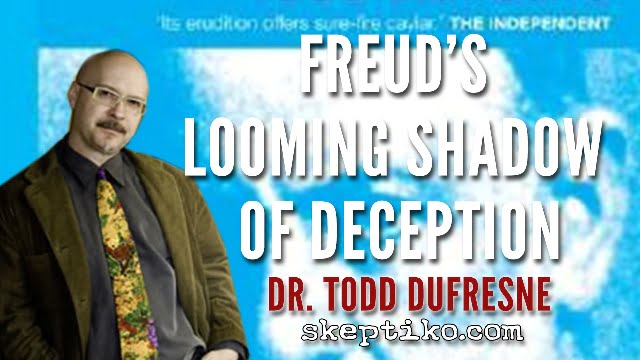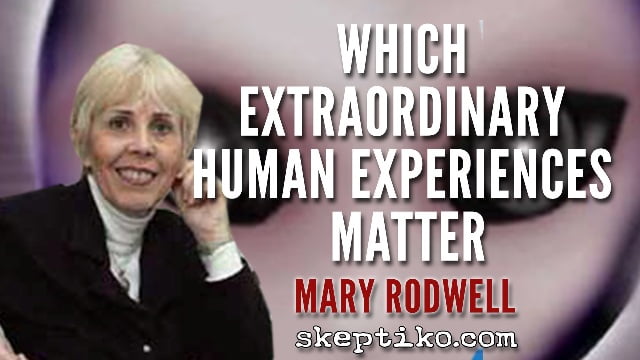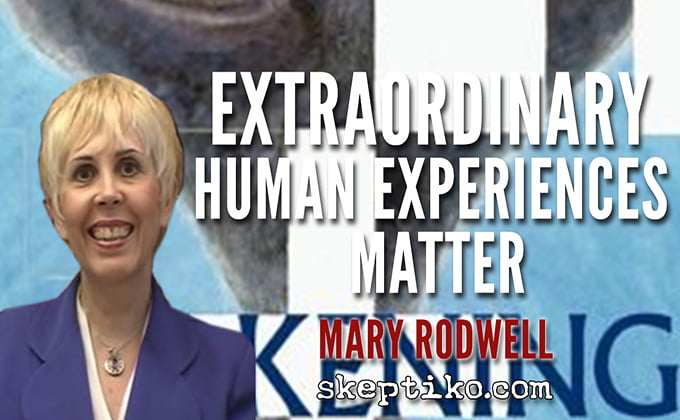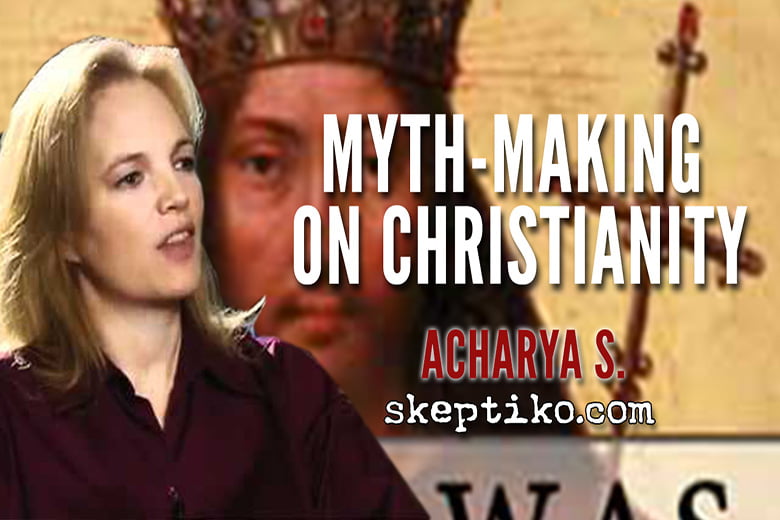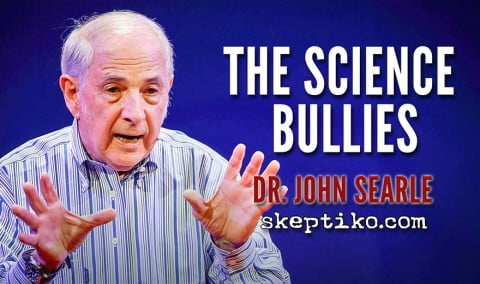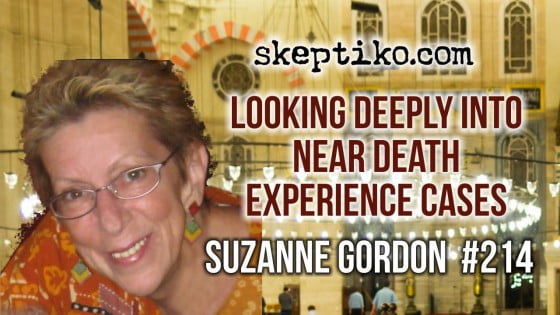Click here for YouTube version Click here for forum discussion Interview with regression specialist, Scott De Tamble explores hypnotic...
Author: Alex Tsakiris
242. Oliver Hockenhull, Neurons to Nirvana
Click here for YouTube version Click here for forum discussion Interview with filmmaker Oliver Hockenhull about the resurgence of psychedelics as...
Controversial history of Jesus draws ire of Christians and atheists. Is Caesar’s Messiah legit? |241|
Interview with Joseph Atwill examines criticisms of his controversial theory about the founding of the Christian church and his book,...
240. Dr. David Lane Not Sandbagged — Patricia Churchland Part 2
https://www.youtube.com/watch?v=VtHzDMwQ9fw Click here for YouTube version Click here for forum discussion Interview with Dr. David Lane...
Dr. Jim Tucker compiles largest database of past life memories |239|
Interview with University of Virginia professor Dr. Jim Tucker about research of children who remember past lives. photo by rogintakesphotos Join...
238. Why Skeptics Are Wrong… About Psychics & Mediums
237. Dr. Patricia Churchland Sandbagged by Near-Death Experience Questions
Click here for YouTube version Click here for forum discussion Interview with neurophilosophy expert Dr. Patricia Churchland reveals a lack of understanding of near-death experience science. Join Skeptiko host Alex Tsakiris for an interview with University of California, San Diego philosophy professor Dr. Patricia Churchland. During the interview Dr. Churchland seems flustered over questions about near-death experience science: Alex Tsakiris: Yeah, but I think we also have problems with the idea that consciousness is an emergent property of the brain thing? I interviewed Christof Koch from Cal Tech last year and he’s the guy who I sent people down this direction that we can no longer claim that consciousness is a product of the brain and we have to move towards this middle position where as he says, consciousness is ontologically distinct, but never really defining how consciousness begins, how consciousness ends, or exactly what the relationship is with the brain. I think a lot of people are more comfortable with Daniel Dennett and Richard Dawkins’ okay, consciousness is an illusion than they are with this middle ground. I don’t really know how that answers the big questions of what the nature of consciousness is other than just to repeat that consciousness is something that the brain does. That doesn’t tell us much. How does it begin? When does it end? What’s necessary and sufficient to cause consciousness? These are all questions that are unanswered by what you’re saying. Dr. Patricia Churchland: Well, neuroscience hasn’t got all the answers yet. Alex Tsakiris: But that’s just passing the buck. We don’t have the answers. Those are fundamental questions. If we don’t have the answers then we don’t have a theory of what consciousness is, right? Dr. Patricia Churchland: That’s what your view seems to be, all right. Alex Tsakiris: I’m just saying these are basic. When does consciousness begin? When does it end? What is necessary and sufficient to create consciousness? If we can’t answer those then what do we really have? What can we really say about consciousness? Dr. Patricia Churchland: Well, I guess we can’t say anything. Alex Tsakiris: Okay. I think we can say some things. Let me ask you this—I didn’t mean to throw you completely off. Do you want to get back to talking about your book? Dr. Patricia Churchland: No, not really. Alex Tsakiris: Okay. What do you think about near-death experience? You write quite a bit about that in your book and what is your general take on near-death experience? Dr. Patricia Churchland: Well, I’m not sure that it really matters, does it? What does it matter for? Alex Tsakiris: I think a lot of folks look at near-death experience as highly suggestive of consciousness somehow, in some way we don’t understand, surviving biological death, which would certainly falsify that other idea that it’s so tied to the brain and that consciousness ends at death. I mean, that would falsify that, right? Dr. Patricia Churchland: Oh, I’m sorry. My dog just came in. No, no, don’t do that. No, no, no, no. Forgive me, I’m sorry. Okay. So yeah, okay, I guess I’ve never have actually had a near-death experience. Have you? Alex Tsakiris: No. Dr. Patricia Churchland: Oh, okay. Alex Tsakiris: But you write quite a bit about it in your book. Dr. Patricia Churchland: So why do you want me to talk about it? Alex Tsakiris: Well, I guess one of the things I did want to ask you is in your book you ask the question, “Is there a neurobiological explanation for near-death experience?” Then you cite NDE researcher and a former guest on this show as answering that question with yes. You say that Dr. Pim Van Lommel believes the answer is yes. Is that your understanding of his research? Dr. Patricia Churchland: Well, I think there’s certainly quite a bit of evidence that at least some near-death experiences have a neurobiological basis. Of course, we can’t be sure about all of them. Maybe you had one that doesn’t have a neurobiological basis. I wouldn’t really know, would I? Alex Tsakiris: Well specifically, Dr. Churchland, you cite in your book that Dr. Pim Van Lommel holds that opinion. That’s clearly not the case. I mean, he’s written… Dr. Patricia Churchland: Has he? Uh-huh (Yes). Alex Tsakiris: Right. Do you want me to read to you what he’s written? He’s written that “The study of patients with near-death experience (and this is from The Lancet paper that you’re citing) clearly shows us that…” Patricia Churchland's Website Listen Now: Download MP3 (25 min.) Read It Welcome to Skeptiko, where we explore controversial science with leading researchers, thinkers, and their critics. I’m your host, Alex Tsakiris, and for this episode of Skeptiko I almost feel like I need to issue one of those warnings that they put on the front of shows that have content that might be inappropriate for some viewers. You know, I’m always surprised when people are squeamish over confrontation, conflict, or debate of any sort. I get that on one level. We don’t want to see people squirm and we want everyone to be nice to each other and all that. I get that. But on another level, I want you to consider that in this interview with Dr. Patricia Churchland, who I’ve really been trying to contact for years. I have emails going back several years in which I tried to contact this woman. She is a well-respected academic, Oxford educated, also UCSD which is a prestigious university out here in California, highly regarded at conferences, gives speeches, and has blabbed about these ridiculous ideas about consciousness that she has.
...236. Rome Viharo, Wikipedia, We Have a Problem
click here for YouTube version click here for forum discussion Interview with social media expert and Wikipedia critic, Rome Viharo exposes...
235. Dr. Todd Dufresne on Freud’s Looming Shadow of Deception
Click here for YouTube version Click here for forum discussion Interview with the Dr. Todd Dufresne examines Sigmund Freud's deception and...
234. Global Warming, Climate Change and Our Illusion of Control
Click here for YouTube version Click here for forum discussion Interview with the Rick Archer host of Buddha at the Gas Pump, and John...
233. Mary Rodwell Which Extraordinary Human Experiences Matter
Click here for YouTube version Click here for forum discussion Interview with the alien encounter researcher Mary Rodwell examines the...
232. Greg Taylor Tells Readers, Don’t Worry There Probably is an Afterlife
Click here for YouTube version Click here for forum discussion Interview with the author of, Don't Worry! There Probably is an Afterlife looks at...
231. Dr. David Jacobs Dismisses Spiritual Alien Abduction Stories
Click here for YouTube version Click here for forum discussion Click here to post comments on AlexTsakiris.com Part two of an interview...
230. Dr. David Jacobs Claims Academia Has Abrogated Responsibility to Investigate Alien Contact
Click here for YouTube version Click here for forum discussion Click here to post comments on AlexTsakiris.com Interview with alien...
229. The 5 Things You Need to Know About Skeptiko
Click here for YouTube version Click here to post comments on AlexTsakiris.com Click here for forum discussion A re-introduction of the...
228. Mary Rodwell Advocates for Alien Contactees
Click here for YouTube version Click here for forum discussion Click here to post comments on AlexTsakiris.com Interview with UFO and...
227. Your Help Needed Defining Rules of New Skeptiko Forum
Click here for YouTube version Click here for forum discussion Click here to post comments on AlexTsakiris.com A new version of the...
226. Acharya S. Examines the Effects of Myth-Making on Christianity
Click here for YouTube version Click here for forum discussion Click here to post comments on AlexTsakiris.com Interview with religion and mythology scholar Acharya S. (D.M. Murdock) examines the effects of early Christianity on other religions of the time. Join Skeptiko host Alex Tsakiris for an interview with Acharya S. author of, Who Was Jesus? Fingerprints of The Christ. During the interview Acharya talks about the religion and myths: Alex Tsakiris: One of the things that your work is really important in doing, and it’s something we didn’t talk enough about, is that it’s a really thorough analysis of the power and practices of cultish behavior, of power formation, and power manipulation. I think unless we really come to grips with this we can’t separate out what happened to these religions. On one hand we have these traditions and these myths and those that made the myths, and on the other hand we have the same characters that we see on the landscape today that say, “Hey, wait a minute. Maybe I can make a buck off of this. Maybe I can control things. Maybe I can make my group superior and win out over the other groups. And maybe I can use these myths to do it.” Unless we thoroughly understand that stuff, and at the same time appreciate the possibility that there is some genuine non-biological-robot, spiritual experiences that may be happening; until all that’s on the table, we can’t really get our arms around it. Acharya Sanning: What I’m just doing is writing a factual recitation of what has happened in these places. It’s very empowering to know this stuff. Also, when we were talking in the beginning about being in the middle between extremists on either side, this mythicism position that I am discussing which looks at supernatural beings in antiquity as mythical figures, not real people who landed on planet Earth and did a bunch of magic tricks. This is really a neutral position because you don’t have to believe in it and you don’t have to dismiss it. You don’t have to be a theist or an Atheist. You can be either one to enjoy this information. All I’m doing is collecting religious and mythological ideas from as far back as we can tell and putting them together and showing their influences on our thinking today. It doesn’t require any kind of belief or any kind of joining or any kind of control... (continued below) Acharya's Website Play It Listen Now: Download MP3 (63 min.) Read It: Today we welcome Acharya S. to Skeptiko. Acharya, whose real name is D. M. Murdock, is a first-rate Biblical scholar and an expert in religious studies and mythology. She is also the author of numerous books including, The Christ Conspiracy, Who is Jesus?, and Sons of God. She also runs a website that is absolutely chock-full of high quality articles and research on the topics we’re going to talk about today. That website is at www.truthbeknown.com. Acharya, it’s great to have you on Skeptiko. Thanks so much for joining me. Acharya Sanning: It’s nice to be here, Alex. Thanks for inviting me. I also have a blog at www.freethoughtnation.com. In fact, I have another one, www.stellarhousepublishing.com. You can search across all my websites and a forum. People are invited to ask questions of me in the forum, as well.
...225. Kevin Williams, Creator of Near-Death.com
Click here for YouTube version Click here for forum discussion Click here to post comments on AlexTsakiris.com Interview with Kevin Williams creator of one of the leading website portals on Near-Death Experience science. Today we welcome Kevin Williams to Skeptiko. Kevin is the creator of www.near-death.com, the #1 website on near-death experiences, both in terms of visitor traffic and in terms of the comprehensive amount of information about near-death experiences, near-death research, and all topics related to this amazing phenomena. Kevin is also the author of Nothing Better Than Death: Insights from 62 Profound Near-Death Experiences. Kevin, welcome to Skeptiko. Thanks so much for joining me. Kevin Williams: Thank you, Alex. It’s my pleasure. Alex Tsakiris: So as I just mentioned, near-death.com is amazingly comprehensive. It pops up on virtually hundreds if not thousands of different search terms. Even if they’re not familiar with the website, people have probably encountered it. Start us off from the beginning. Tell us how you started it, why you started it, and the driving force behind it. Kevin Williams: First of all, I’m a big believer in synchronicity and it seems like most of my life I’ve had that. When I was a kid, my dad had a small CRT screen and for some reason I knew that I could build it so that people could ask questions to it and get answers back. I just had that in my mind for a long time. I don’t know why. Then when I went to college and got into computer science, I graduated just about the time when the Internet was taking off. Before that time I read Raymond Moody’s book, Life After Life. That was the late ‘70s. Since then I couldn’t get enough books to read on the subject. It was kind of a synchronistic time that I just happened to learn how to build websites at a time when I was fully knowledgeable about near-death experiences and a time when I was able to build a website. I started really early. Part of the reason why I get a lot of hits on different keywords is because I designed my website as a portal, which means that there are usually only two or three levels deep in my website. I built it that way specifically so that it would do that. It has the ability to access a lot of information right upfront and also it would be a lot easier to navigate. (continued below) Play It Listen Now: Download MP3 (44 min.) Read It: (continued...) Alex Tsakiris: So you did not have a near-death experience prior to starting this, is that right? Kevin Williams: Yes, that’s true. I’ve never had a near-death experience. But once you read enough of them you almost feel like this is information that you’ve known before. In fact, a lot of near-death experiencers, during their experience they’ll receive knowledge like that, forgotten knowledge. The more I read about it, the more I realized that this was true for me and that everybody has actually experienced death many times through reincarnation. So that was part of it right there.
...224. Dr. John Searle and the Science Bullies
Click here for YouTube version Click here for forum discussion Click here to post comments on AlexTsakiris.com Interview with esteemed Berkeley philosopher and consciousness researcher Dr. John Searle examines the state of academic consciousness research. Alex Tsakiris: What we’ve been exploring is some of the evidence suggesting that consciousness may not be purely biological. We really started with parapsychology and folks like Rupert Sheldrake from Cambridge and Dean Radin who used to be at Bell Labs and is at IONS. But put all that aside because the real kicker is near-death experience science. Here are these doctors, in hospital, carefully controlled experiments over and over again, and the brain you’re talking about, Dr. Searle, is gone. It’s non-functioning; it isn’t there; and yet some kind of conscious experience that’s able to see and recall what’s going on continues. That evidence is pretty overwhelming at this point. What do you do with that? How does that fit into your model? Dr. John Searle: I don’t know. The stuff that I know about this tends to be rather anecdotal. Now maybe there is some really systematic, large-scale study of near-death experience that shows you can have consciousness without a brain but I don’t know of any such study. What I’ve heard is largely anecdotal. The mistake that people tend to make is they think, look, either these people are lying or there’s a miracle. Of course, both of those are probably wrong. People are perfectly sincere who report near-death experiences but it doesn’t follow that you can have consciousness completely separated from the brain; that this miracle is actually taking place. I’d have to know a whole lot more about it and see more systematic studies, as I said. The accounts that I’ve heard tend to be anecdotal. They tell a story about a guy who has had some unusual experiences. Alex Tsakiris: There is actually a lot of published work on this. The best compilation is probably The Handbook of Near-Death Experiences edited by Jan Holden at the University of North Texas and Bruce Greyson at the University of Virginia, who is very well-known in this area. Dr. John Searle: I don’t know enough about this stuff to have an intelligent opinion. Of course, it might turn out that 100 years from now we’ll have this conversation in heaven or in my case more likely the other place. The idea that you have to have a brain in order to be conscious, that’s a kind of silly idea people had back in the 21st Century. It might turn out that way; I don’t think it will. ---------- On today's episode I have an interview with Dr. John Searle. Now, before we get to the interview I want to tee up a question for you. As you know, I usually do this at the end of the show, but since the question relates to the quote you just heard, and since the question relates to something else I want to talk about I'm going throw it out there now -- How do you explain Dr. John Searle's willful ignorance of near-death experience science? Moreover, why is he so clueless about parapsychology? And most importantly, why does he think it’s ok to summarily dismiss all evidence pointing to any model of consciousness other than his hopelessly obsolete mind=brain clunker. Let’s consider near-death experience science since it's the most dramatic example of science that delivers an evidence-based kill-shot to the mind=brain carcass. How can a highly acclaimed, internationally renown expert on consciousness, who gives TED talks and is invited to scholarly symposiums on consciousness, how can that guy be less informed about the published peer-reviewed literature than your average Oprah Winfrey fan? It's not like he doesn't understand what's at stake. As you'll hear, he agrees the survival of consciousness question is central to all other scientific assumptions about consciousness. So why is Dr. Searle shamelessly, unapologeticly ignorant of this science? Well, that's the other thing I wanted to talk about before we get to this interview -- science bullies. Back in March of 2013, Robert McLuhan published an article on the organized effort of Skeptics/Atheists to rig Wikipedia (Guerrilla Skeptics). By organizing themselves into a tight-knit team and dedicating themselves to making literally thousands rule-bending Wikipedia changes, these self-described Guerrilla Skeptics have had remarkable success. For example, Parapsychology is a lost cause on Wikipedia. It's absolutely impossible to get anything close to a "neutral point of view" from Wikipedia on any parapsychology topic. If you don't know what I mean, and you have a strong stomach, go to Wikipedia see for yourself. If you're a listener to Skeptiko, and you have a really strong stomach, search "psychic detective." Now, if you are appropriately outraged, and have a strong masochistic streak, enter Wikipedia as an editor and try and straighten out one of those pages. I mean, you're supposed to be able to do that, right? Wikipedia is an open-source encyclopedia. Anyone with knowledge of the subject is supposed to be able to edit, right? But before you try and fix things over at Wikipedia read this blog post from Craig Weiler titled, The Wikipedia Battle for Rupert Sheldrake's Biography. And then take a look at Dr. Rupert Sheldrake's article on the same topic (Wikipedia Under Attack). As a listener of this show, none of this is new to you. You know the dogmatic craziness of these fundamentalist Skeptic/Atheist groups can rival any religious cult, but you might be surprised at the zeal with which these group are going after science. Rupert Sheldrake after all isn't a bible-thumper. He's not a creationist. He hasn't taken a stand against, "a woman's right to choose", or called for a ban on gay marriage. No, he's a Cambridge biologist who wrote a book about Dogs that Know When Their Owner's are Coming Home. And followed it up with a book about how science might want to be a little less dogmatic about defending the materialistic status quo. There are many highly esteemed scientists who think Sheldrake's ideas are brilliant and admire his willingness stand up to the attacks he's had to endure, but none of that matters to the science bullies. The biggest problem is not Guerrilla Skeptics on Wikipedia, or iTunes, or Reddit or any of the places these folks go to try and heal their meaningless-by-definition lives (Atheist dogma, see: ep. 219, ep. 221). The problem is the impact they have on Dr. John Searle. Because you see, Berkley Philosophy professor, Dr. John Searle is not a professional Skeptic. He's not a fire-breathing, you-are-a-biological-robot Atheist. In fact, within the mainstream science community he's seen as a progressive because he's willing to reject the silliness of the "conciseness is an illusion" nonsense that still grips many die-hard materialists. But when it comes to the tough stuff, the stuff that would truly set science free from the materialistic/reductionistic/atheistic dogma that cripples it, Searle is willfully ignorant. Is it an ignorance borne out of a chummy academic life and a long list of accomplishments? Perhaps. But I think this ignorance is also a byproduct of a materialistic science culture that has been traumatized into complacency by Skeptical Bullies who push, shove, and spit insults any free-thinking academic who dares to challenge their status quo. It's not that Searle is playing to the Skeptics; he's unwittingly absorbed their eyes-wide-shut worldview into his own without forethought or deliberation... and that's the greatest threat to science. So, let's hear from Dr. John Searle. It's a short interview, mainly because I ran out of things to say to someone who thinks parapsychology died with J. B. Rhine in 1980 (continued below). Play It Listen Now: Download MP3 (34 min.) Read It: Today we welcome esteemed Berkeley philosophy professor, Dr. John Searle to Skeptiko. Dr. Searle has a worldwide reputation for his acclaimed work on the philosophy of mind and language. He’s the author of over a dozen books and hundreds of articles and papers exploring issues of consciousness and mind/body mysteries. Dr. Searle, welcome to Skeptiko. Thanks so much for joining me. Dr. John Searle: Thanks for having me.
...223. Dumbest Explanation Yet For Near Death Experience
Click here for YouTube version Click here for forum discussion Click here to post comments on AlexTsakiris.com Examination of recent research from the University of Michigan linking surge in brain activity of dying rats to near-death experience science. Join Skeptiko host Alex Tsakiris for a look at two interviews that shed light on recent reports suggesting a scientific explanation for near-death experiences has been discovered in the work of Dr. Jimo Borjigin, at the University of Michigan. The study found a surge in electrical activity in the brains of dying rats. Researcher and science writers offered this as a possible expatiation for human near-death experiences. As we’ve seen in the past, research supporting a convention explanation for near-death experience receives considerable attention form the mainstream science media. This study was no exception with stories popping up on the BBC, ABC, CBS, FOX, National Geographic and many other media outlets. (continued below) NPR's report on the research Play It Listen Now: Download MP3 (43 min.) Read It: Many Skeptiko listeners sent me this links to the various reports on this research, and I kept pointing them to a past interview I had done a couple of years ago relating to this topic, but since I never mentioned it on the show I thought I do so now. In June of 2011 I interviewed George Washington University Medical Center Professor, Dr. Lakhmir Chawla, who discovered a surge in the brain’s electrical activity seconds before death might in humans. Here’s a clip from Skeptiko episode 140: --------- Alex Tsakiris: So, Dr. Chawla, in 2009 you published a paper with the surprising discovery that some of your patients who were very close to death experienced a final surge in brain activity and the paper has gained quite a bit of traction, media attention, mainly because of this quote of yours: “We think that near-death experiences could be caused by a surge of electrical energy as the brain runs out of oxygen.” It‘s been a while since that paper was published. So first I want to ask you, do you still think that what you saw has anything to do with near-death experience? Dr. Lakhmir Chawla: Obviously all of the patients in our study passed away so there’s really no way for us to truly know if what these people were experiencing is, in fact had they survived, being the signature of a near-death experience. What we did notice which was very striking is that in all these patients--and in this study we reported on seven patients on which we had very good documentation. We’ve seen these electrical surges, EEG activity, at the end of life in over 100 patients and what we basically have, I hypothesize that when people pass away something occurs in their neural structure. We have a hypothesis for why this may be happening, that causes this large intensity of electrical energy. What we basically hypothesize further and speculate is that if somebody within the field, someone who’s having a heart attack, for example, and their heart stops and the oxygen to their brain went down and they have this sort of terminal surge of energy and then they were resuscitated and brought back, it’s very likely that they would recall that electrical surge. If they did recall that electrical surge, we hypothesize and speculate that that could be what people describe in their near-death experiences. The one thing that we’ve seen rather consistently when you read the literature of near-death experiences is that not everyone has the same imagery. Not everyone has the same experience. But the one thing that they all have in common is that the experience is very intense and very vivid. People can usually recall many, many years later on with great detail what they experienced. So it would take something that would be a very durable electrical event of energy for someone to have that. So we put those notions together and arrived at that speculation. Alex Tsakiris: Okay. I just wanted to confirm that and it’s interesting that you reference the near-death experience literature. I’ve had a chance to interview some of the world’s leading near-death experience researchers and gosh, I even went back and talked to some of them about this. I couldn’t find any of them that would even seriously entertain that kind of speculation. As a matter of fact, privately one of them told me, and this is pretty harsh, but he said, “It’s one of the dumbest explanations for near-death experience yet published.” So I guess I was really wondering exactly where you’re coming from, exactly what near-death experience research you’ve dug into that makes you feel like the speculation that you’re talking about would fit the broader research that’s been done into near-death experience. Dr. Lakhmir Chawla: No, I mean I’m not a researcher in near-death experience. That’s not my primary scientific interest. We are basically at the bedside taking care of very sick patients in the intense care unit. I don’t pretend to have any incredible insight into what these are or are not. All we are saying from our group’s scientific standpoint is that we see a very consistent signature for patients when they’re passing away. We are not the only investigators to report this; it’s now been investigated and reported by multiple investigators.
...222. Jean-Charles Chabot Explores Spiritual Hypnosis
Click here for YouTube version Click here for forum discussion Click here to post comments on AlexTsakiris.com Interview with hypnotherapist Jean-Charles Chabot examines the use of hypnotic regression for spiritual growth. Join Skeptiko host Alex Tsakiris for an interview with Montreal-based hypnotherapist Jean-Charles Chabot. During the interview Chabot talks about the use of regression therapy in overcoming phobias: Alex Tsakiris: Can you give us a quick example of a case where there was a memory from early in life, and they forgot about it, and then once they remembered it resolved some phobia for them. Jean-Charles Chabot: I’ll give you a couple of examples, one with regression in this life, and one in a past life. For example, a person had a fear of spiders. She said, “I don’t remember anything about what could explain this fear of spiders.” She couldn’t get close to a spider. So I brought her into an altered state of consciousness and I asked the unconscious mind to go back. So the first event the person went to was when she was young, lying beside a pool. She’d just gotten out of the water and there were drops of water dripping down her body. At some point there was some itching and there was a spider there. She just freaked at that point. Then what we usually do is we can ask the person a question, and say, “I don’t want you to think. I want you to feel. Does this emotion feel new like oh my god, what is this? Or does it feel familiar, like oh, not again?” It was familiar to her so I said, “Okay, now we’re going all the way back to the source.” What was very interesting was that she was about two years old and she was playing with a spider that was on her. When you’re one or two years old it doesn’t matter, right? It’s just a spider; there’s nothing wrong. She takes the spider and she puts it in her mouth. For a kid, no problem. But the problem was when the mother saw this and said, “No!” And then, boom, association of spider and dangerous, spider bad, mommy doesn’t like it so I shouldn’t like it. That’s where it all started. It’s very interesting when you have things like that that you understand where it comes from and you can do some techniques. One technique among others is the “informed child,” where you instruct the child what he would have needed to know to be conditioned by this and then we eradiate this knowledge. There are many things you can do. Alex Tsakiris: Were you able to help her over her phobia, then? Jean-Charles Chabot: Oh, yeah. It was really interesting because afterwards for me, I like to test my work. Afterwards we went into the basement looking for spiders. We found some little spiders and she could have them on her finger and she was like, “Oh my god, I never did that before.” It was really amazing. I said, “Okay, let’s take it a step higher. Let’s go to the pet shop. I had in mind like these tarantulas, those big spiders. I didn’t know they were really dangerous, so I just went to the counter and asked if it was possible to look at the tarantulas, to clear it with them. The people at the counter were like, “I’m not touching those. They can sting. They can really hurt. They won’t kill you but they can really, really hurt.” Then the owner came and said, “Oh, they’re really nice. As long as you don’t do anything that irritates them, like blowing on them or sudden moves or stuff, it’s all fine.” So he took a spider and told her to put her hand like a bridge. The spider came and she just had this amazing feeling of oh my god, this is amazing. She could do it without any problem. Jean-Charles Chabot's Website Play It Listen Now: Download MP3 (63 min.) Read It: Welcome to Skeptiko, where we explore controversial science with leading researchers, thinkers, and their critics. Today, hypnosis. In fact, a very controversial area of hypnosis—past life and between life regression, where people purport to recall and recover memories of living in a previous life, or the time they spent between lives. Quite out there, if you will, so before I start with this interview I thought I’d share a little bit about the path that I’ve taken in trying to get my arms around this topic. Let’s start with reincarnation. Obviously, billions of people believe reincarnation is true. Moreover, thousands of people have reported personal experiences or memories suggesting that it’s true. Is there any scientific evidence for this? Now since I know the Skeptiko audience, I know that a lot of you know that there’s actually quite a bit of very good evidence.
...221. Atheist John Loftus Explains Why He’s a Biological Robot
Click here for YouTube version Click here for forum discussion Click here to post comments on AlexTsakiris.com Interview with atheist and Christian debunker John Loftus examines the philosophy of atheism. Alex Tsakiris: When we falsify this idea that you are a “biological robot”, and accept that’s absurd, and once we get past the idea that consciousness ends at death, which again, that’s where the evidence points, then a lot of things start falling differently in terms of how I orient myself to the world, how I orient myself to other people, how I orient myself to morals, purpose, meaning in life. You are not a biological robot, John. John Loftus: Okay. I disagree. I’ve said why. Alex Tsakiris: You say, “I am a biological robot. I am going to stand by that.” Right? That’s what you’re saying? John Loftus: Well, there’s no evidence for invisible beings, right? Entities. Alex Tsakiris: But you, as you live your life, you live your life like a biological robot? John Loftus: Everybody does. That’s all there is. Alex Tsakiris: Okay. John Loftus: Well, you have to look into the philosophical quandaries with trying to distinguish between mind and body. I mean, I taught the Introduction to Philosophy classes that you would probably be interested in looking at how they’ve tried to relate the mind and the body. They just really can’t do it. It’s really ludicrous to see how they do that. (interview transcript continued below) John Loftus - Debunking Christianity UPDATE: Follow-up Email Exchange (click here) Play It Listen Now: Download MP3 (64 min.) Read It: Welcome to Skeptiko, where we explore controversial science with leading researchers, thinkers, and their critics. I’m your host, Alex Tsakiris, and this episode of Skeptiko is yet another in this series I’ve been doing on Atheism. Now I do feel a need to tell you a little bit about how I came to do this interview because, as you know if you’ve listened, you just heard a similar kind of debate with philosophy professor Dr. Stephen Law. Actually, these two interviews with Dr. Law and John Loftus came about as the result of my interview on Episode 217 with Gary Marcus, because Gary Marcus is this NYU professor of psychology, bestselling author, writes frequently on consciousness issues, yet if you listen to the interview you’ll hear how he stumbled with some basic questions about consciousness.
...Esquire Magazine caught lying. Dr. Eben Alexander’s NDE account prevails |220|
Interview with Robert Mays reveals a disturbing pattern of misrepresentation and distortion in Luke Dittrich's Proof of Heaven expose published in Esquire Magazine. photo by Derek K. Miller Join Skeptiko host Alex Tsakiris for an interview with Robert Mays about his recently published article, Esquire article on Eben Alexander distorts the facts. During the interview Mays talks about what his investigation discovered: Alex Tsakiris: The Dittrich article in Esquire, it's extremely well-crafted. Let's give them that. And he builds this case with the facts that he has, but he really builds this whole thing around -- this guy's a liar. He approaches it from a number of different angles, some of which are really substantive to the story like the coma thing, and these other things that he picks at, but they do kind of stick in your mind as you're reading the article. Like the rainbow thing. Tell us what the rainbow thing is all about and then tell us what you found out. Robert Mays: In the book, on Sunday morning according to the story that Dr. Alexander wrote, his sister, Phyllis, and his mother, Betty, were coming into the hospital and saw a perfect rainbow. They felt this was a sign. Dittrich took this as saying Heaven itself was heralding Eben Alexander's return. Dittrich then asked the meteorologist whether there could have been a rainbow then and the meteorologist said, “Well, the day was clear so there couldn't have been.” I said, “Well, wait a minute. Two people said they saw it.” So I called Phyllis Alexander and she said, “Definitely we saw a rainbow. Betty remarked that it was a perfect rainbow.” They talked about it. Then they went immediately up to Eben's room and there Eben was, sitting up. So that was the time that he had recovered. Alex Tsakiris: And just to add a little tidbit that you talk about in your article that I thought was great and is the real kind of journalism that we would have liked to have gotten from Esquire is that you not only talked to these eyewitnesses, which he did not--he just went on some meteorological report--but they also had evidence. It was such a spectacular event that they had written an email. Robert Mays: Right. That day Phyllis said she had written to friends in Boston who were praying for Eben. She said, “Eben has recovered and I saw a beautiful rainbow as I was coming into the hospital.” So there's that documentation, as well. So Luke Dittrich's argument there is empty. Alex Tsakiris: It's shoddy journalism. If you're trying to debunk something, which I've run across so many times, that's one thing. You're a debunker. You're just out there throwing whatever you can against the wall and seeing what sticks. But if you're Esquire, who still has some kind of legitimacy as a journalistic enterprise, you have to do more than this. You have to talk to witnesses. You have to get their side of it. I think this lays a pattern for what else we're about to talk about. (later) Alex Tsakiris: Here's what you get from Luke Dittrich's story in Esquire -- Dr. Laura Potter discredits Dr. Eben Alexander's story. It couldn't have happened the way he described. He wasn't really in a coma. He was delirious. So why don't you pick up from there, Robert? You've said you put a couple calls in to Dr. Potter at this point in the story. You haven't heard back. What happens next? Robert Mays: I received, from members of the family copies of emails that they had been sending back and forth. In that was a statement that Dr. Potter had made. Later I learned it was a statement that she had issued to a news organization. Apparently that news organization did not use it. In any case, that statement was that she was misquoted and taken out of context. So I said, “Whoa. This is really quite strange.” Alex Tsakiris: In fact, she stated that her account was misrepresented, and that she felt like the questions weren't fair. And this is backed up by what you heard from the family, right? Because the family talks to Dr. Potter and she's apologizing, saying “Gosh, I don't know how this happened.” That's what I took away from your article. Is that what you got from talking to the family? Robert Mays: Right. And basically Dr. Potter expressed to the family that she had been misrepresented and that her words were taken out of context by Luke Dittrich and that he had led her to say certain things. The question that Luke Dittrich says he posed to her I don't think is a question he actually posed to her when she said, “Yes, conscious but delirious.” It would be very interesting to see what exactly happened in that interview and just understand what she was responding to. Alex Tsakiris: I think it would be more than interesting. I think it's absolutely his responsibility, given the damage that this article has done and sought to do from the beginning. There's an added level of journalistic responsibility to get your facts right. These things being called into question this way demands that he really back up his claims. (interview transcript continued below) Robert and Suzanne Mays Website Click here for YouTube version Click here for forum discussion Commentary: Esquire article on Eben Alexander distorts the facts Read It: Today we welcome Robert Mays to Skeptiko. Robert, along with his wife, Suzanne, have been longtime researchers in the field of near-death experience and consciousness studies. They've published quite a few papers and have done presentations for both, the International Association of Near-Death Studies Conference, and the well-known Science of Consciousness Conference in Tucson, Arizona. So, anyone who's familiar with this field very well might have bumped into the work of these two very interesting and excellent near-death experience researchers. Robert is here today to talk about a new article they just published titled, “Esquire Article on Eben Alexander Distorts the Facts,” in which they tell about their investigation into the near-death experience account of Harvard neurosurgeon Eben Alexander, who last year published a blockbuster best-seller book titled, Proof of Heaven: A Neurosurgeon's Near-Death Experience and Journey Into the Afterlife. So with that I'd like to introduce you to Robert Mays. Robert, thanks so much for joining me today on Skeptiko. Robert Mays: Thank you. I'm glad to be here. Alex Tsakiris: Before we dive into this article that you've published on Dr. Eben Alexander's case and then the book and the controversy that's stirred up around that, I thought you could tell us a little bit about the research that you and Suzanne have done. In checking out your website there's a lot of stuff that you guys have published in this field. Tell us a little bit about that.
...219. Dr. Stephen Law On How Science Handles Extraordinary Claims
Interview with philosopher and noted atheist Dr. Stephen Law examines the philosophy of science and extraordinary claims. Join Skeptiko host Alex Tsakiris for an interview with Dr. Stephen Law author of, Believing Bullshit: How Not to Get Sucked into an Intellectual Black Hole. During the interview Law talks about how science measures extraordinary claims: Alex Tsakiris: This idea of extraordinary claims requiring extraordinary proof, you want to talk about sweeping mystery, sweeping evidence that you don’t like under the rug, here is the mantra for the Centre for Inquiry crowd. I see that as an intellectually feeble pronouncement -- extraordinary claims require extraordinary proof—that is anti-science, isn’t it? Dr. Stephen Law: Why do you think that? Alex Tsakiris: We’ve built this whole institution of science, the whole process of peer-review, the whole process of self-correction around this idea that we will altogether discover what is real, what is not real, what is extraordinary, what is not extraordinary. So the idea that after the fact, after the results come in, we say, “You know, those are pretty interesting results but I deem that to be extraordinary; therefore, you’ll need an extra level of proof on that.” I think it’s just silly. Dr. Stephen Law: Okay, I think I see where you’re coming from. The way I’ve understood that principle, extraordinary claims require extraordinary evidence, says that suppose I tell you that over there, I’ve got a mobile phone and a cup, okay, and I do this, there’s the mobile phone and the cup. You’re going to go, “Hey, yeah, that’s good enough for me.” Steve’s got a mobile phone and a cup. If I now wield out a fairy which I make dance on the end of my finger and go, “There you go, a fairy on the end of my finger,” you’re going to go, “Yeah, Steve’s got a fairy on the end of his finger. Fair enough. I’ll accept that on the basis of the same kind of evidence that I accepted he’s got a cup with a mobile phone.” I bet you would not. Alex Tsakiris: Sure, but we’re talking about science here. We’re talking about peer-review. The example I sent you and I have personal experience with, because he told it to me on this show, is British psychologist and parapsychology critic, Richard Wiseman. He has investigated probably more of these paranormal parapsychology claims, like telepathy, than anybody else. Here’s his quote: “I agree that by the standards of any other area of science that remote viewing (and he later added in this quote, ESP) is proven. But that begs the question: do we need higher standards of evidence when we study the paranormal?” So Stephen, this is not a fairy in the cup. This is a guy who has reviewed hundreds of peer-reviewed papers and is saying, You know what? It’s good enough for any other field of science but not good enough here because of the ground-breaking upset it would make for science. This is the best evidence I could give you for my claim about scientific materialism being woven into science as we know it. Dr. Stephen Law: I think if I stick my finger out there and it appears to be a finger with a fairy spinning around on the end of it, you’re going to be very, very suspicious. You’re not just going to say, “Yeah, Stephen’s proved to me that there are fairies.” You’re going to require much more investigation before you take my word for it that there really is a fairy spinning around on the end of my finger. Why is that? It’s because the prior probability of anything like a fairy exists is very, very low indeed, knowing what we do. (continued below) Dr. Stehpen Law's Blog Click here for YouTube version Click here for forum discussion Play It Listen Now: Download MP3 (64 min.) Read It: Alex Tsakiris: Let me, in that spirit, return to your book, Believing Bullshit, with another quote that I liked: “The more we appeal to mystery to get ourselves out of intellectual trouble, the more we use it as a carpet under which to sweep inconvenient truths or discoveries, the more vulnerable we become to deceit. Deceit by both others and by ourselves.” Let me juxtapose the quote from your book with a quote from biologist Rupert Sheldrake, author of The Science Delusion, one of these folks out there among many, many that I’ve spoken with and are out there who can see this scientific materialism and the position of folks like Richard Dawkins as a major impediment to really moving forward and answering some of these big questions. Here’s what Sheldrake says: “For more than 200 years, materialists have promised that science will eventually explain everything in terms of physics and chemistry. These believers are sustained by the faith that scientific discoveries will justify their beliefs.”
...218. Steve Miller, Does Near-Death Experience Science Contradict Christian Doctrine?
Interview examines whether or not near-death experience research conclusions contradict Christian doctrine of heaven and the afterlife. Join...
217. Dr. Gary Marcus Sandbagged by Near-Death Experience Science Questions
https://youtu.be/4j3CAv3noSQ Interview examines mainstream psychology's approach to near-death experience science. Join Skeptiko host Alex Tsakiris for an interview with Dr. Gary Marcus author of, Kluge: The Haphazard Evolution of the Human Mind. During the interview Marcus explains why he’s skeptical of near-death experience science: Dr. Gary Marcus: I’m also very, very skeptical of . It doesn’t make sense to me, to be honest. It doesn’t fit with the rest of the stuff that I understand about how the brain works, which leads me to believe that something is likely being misinterpreted. I can’t promise that and I haven’t read every word on it… Alex Tsakiris: Have you read any word on it? Have you read any of the leading researchers out there? Dr. Gary Marcus: I’ve read a few words here or there but it doesn’t make sense to me. It would be like you asking me have I read anything on astrology. I mean, I know about astrology but I don’t see the causal mechanisms. Alex Tsakiris: Yeah, but it’s not really astrology. You’ve got Parnia at Cornell, you’ve got the University of Virginia researchers. You’ve got a lot of pretty well-respected people who’ve studied it for a long time and are publishing... Bruce Greyson and all those folks... Dr. Gary Marcus: I don’t doubt that there’s a phenomenon that needs to be explained but I doubt that the explanation is that the brain is not part of the experience that’s being processed. I cannot conceive of how that would be true. Alex Tsakiris: But isn’t that where it gets interesting? These guys are coming at it strictly from a medical standpoint and saying, “Look, the guy died on my table and then told me what happened during resuscitation.” That’s a medical mystery that defies explanation in our current paradigm. Isn’t that where we start? Dr. Gary Marcus: A more parsimonious explanation is the guy wasn’t really dead on the table. There was more stuff happening in the brain than you realize. It’s parsimonious because it fits with everything else we understand about the brain. Otherwise you have to invent a new causal mechanism. I’m not saying that that’s wrong, but I think the standards for doing that need to be high. (continued below) Dr. Gary Marcus's Webpage Click here for YouTube version Click here for forum discussion Play It Listen Now: Download MP3 (29 min.) Read It: Welcome to Skeptiko, where we explore controversial science with leading researchers, thinkers, and their critics. I’m your host, Alex Tsakiris, and as you just heard, my guest today is Dr. Gary Marcus. Now this is one of those interviews that requires a bit of an explanation, not so much for the content of the interview but for why I would even choose to interview Dr. Marcus in the first place. But that explanation should really come at the end, and that’s where I’ve put it. So for now, here’s my interview with Dr. Gary Marcus:
...216. Dr. Dean Radin Urges Science to Examine the Supernormal
Interview examines the connection between ancient yoga practices and the science of extended human consciousness. Join Skeptiko host Alex Tsakiris for an interview with Dr. Dean Radin author of, A Supernormal: Science, Yoga, and the Evidence for Extraordinary Psychic Abilities. During the interview Radin explains how he science can approach such topics: Alex Tsakiris: I wonder if we’re nibbling around at the edges of something that we have to swallow whole. As you mention in your book, Supernormal, and have mentioned previously in this interview, these yogic traditions don’t point to supernormal powers. In fact they go to great lengths to say, “Hey, it’s not about these supernormal powers. Don’t worry about them. It’s about changing your connection and how you relate to—for lack of a better word—God.” If we’re not willing to tackle the Divine then we’re playing a different game but are we playing the game? Dr. Dean Radin: That’s a very good point. It’s true that the yogic path and many of these other mystical paths are basically pointing to enlightenment. Enlightenment is so far away from where science is that it’s probably too far a reach for now. And it’s also true that these traditions say you’re going to bump into these psychic things and don’t pay attention to them because they’re just yardsticks on the way to something more interesting. I would say that from the ancient traditions that advice was probably sound. Well, we’re in the modern age now and what science is able to do is study not the depths of enlightenment but we certainly can study the very place where mind and matter meet. It’s where the deep subjective and deep objective meet, and that is psychic phenomena. So the reason why the book is an entrée into that, it says you know what, science? We don’t know yet as scientists how to go all the way down to or all the way up to the enlightenment but we can begin to go much, much deeper than we have before. And in the process of studying the very area, that very boundary that the ancients would say not to pay attention to, well, we have to pay attention to that. (continued below) Dr. Radin's Webpage Click here for YouTube version Click here for forum discussion Play It Listen Now: Download MP3 (37 min.) Read It: Today we welcome Dr. Dean Radin to Skeptiko. He’s here to talk about his new book, Supernormal: Science, Yoga, and the Evidence for Extraordinary Psychic Abilities. Dr. Radin, of course, is Chief Scientist at the Institute of Noetic Sciences where he’s become one of the world’s best-known researchers on extended human consciousness. His two previous books, The Conscious Universe, and Entangled Minds, were truly ground-breaking and provide the scientific foundation for much of the current interest there is in this field. Dr. Radin, welcome to Skeptiko. Thanks so much for joining me. Dr. Dean Radin: Thanks, Alex. It’s a pleasure to be here. Alex Tsakiris: A lot of people are very excited about this new book of yours, Supernormal. Can you start just by telling us briefly what it’s about? Dr. Dean Radin: Well, one way of getting into the topic is that you may know that the Dali Lama for years now has been having dialogues with scientists on the relationship between Buddhist ideas and practice and science. Primarily physics and the neurosciences. One of the things that you see when you read the transcripts of what goes on in these meetings, and have spawned a number of popular books as well, is that the Dali Lama is very interested in science and the practice of science and what science has discovered. He has said many times that if science demonstrates that something about Buddhist practice or beliefs is incorrect that they’ll change their beliefs and practices. They’re after the truth. So that’s laudable. You would hope then that the same would be true on the scientific side, that if some scientific assumptions turn out not to be completely correct that scientists will correct them, as well. But after reading the transcripts you see that what we’re dealing with is an asymmetry. There’s a lot of interest on the part of the Buddhists on what science has to say but there’s so far very little interest on the part of science on what Buddhism has to say. You see this in stark contrast when the Dali Lama repeatedly tries to bring up issues about reincarnation and about the use of the Oracle and other things that we might consider to be psychic phenomena or related to that. The scientists present usually know nothing about these topics and they dismiss them. They dismiss them in a kind and gentle way so they don’t piss off the Dali Lama but nevertheless they say there’s no evidence so we can go on to other topics. I was just struck with this because for one thing, it really shows that the people that are talking to the Dali Lama are very straightforward, mainstream, very good at what they do, but they don’t actually know what they’re talking about when they dismiss these topics. And in almost every meeting there’s the Dali Lama or somebody else at the meeting who will try to raise well, what about telepathy? What about these issues? And it doesn’t go anywhere. So I was becoming annoyed at watching this year after year and I decided to write a book that looked in more detail at the origins of why the Dali Lama and other people say these things and what’s wrong with science.
...215. Victor Zammit Grills Skeptics with Lawyer’s Evidence for Near Death Experience
Interview examines a near-death experience science from a legal perspective. Join Skeptiko host Alex Tsakiris for an interview with Victor and...
214. Dr. Suzanne Gordon Looks Deeply Into Near Death Experience Cases
Interview brings ethnographic perspective to discover the meaning of near-death experiences to those who have had them. Join Skeptiko host Alex Tsakiris for an interview with Dr. Suzanne Gordon author of, Field Notes From the Light: An Ethnographic Study of the Meaning and Significance of Near-Death Experiences. During the interview Gordon talks about bringing Ethnography to near-death experience research: Dr. Suzanne Gordon: The interesting thing about ethnography is that it’s very time intensive. I spent a decade on the dissertation but there were two two-year periods of full-time field work. I was spending more time with people who had had near-death experiences than I was with my own family. Alex Tsakiris: Give us a sense for some of these cases. They’re just amazing. Maybe start with the Atheist. I love that one. Dr. Suzanne Gordon: Let’s start with Eric. I had everybody choose their own pseudonyms because that’s very informative. This guy chose Eric because he was a guitar player and he really liked Eric Clapton. The interesting thing to me about his account was I think it points to why it’s important for experiencers to become visible. Alex Tsakiris: Tell us about his case. Dr. Suzanne Gordon: Well, he was on the sailboat of a friend of his who was a cardiologist, conveniently enough. There was some accident and he ended up falling overboard. It was a cold day. He was burdened by clothing. He died. Then, left his body and watched the resuscitation efforts on the boat below him as he was floating away. He didn’t see God. He said, “I was very happy wherever I was going. I’m not sure where I was going but I was floating away and I was very happy to do that. I wasn’t struggling to live. I was very happy to keep going and see what happened.” They kept working on him and they’d give up periodically and then they’d work on him some more. Finally they did bring him back. He didn’t become a religious guy or anything. The only reason he even knew it was a near-death experience is because his wife had read Ray Moody’s book and pointed it out to him. He kept apologizing throughout the process. “I’m sorry. I’m just really not very interested.” I’d keep reassuring him, “I don’t care, it’s fine.” Alex Tsakiris: That’s fascinating. On the other hand, there’s a different way to read that account -- it’s the ultimate attachment to a worldview. So I’m an Atheist, I have this transformative experience, and now I know that life goes on, right? Because he does say that at the end. He goes, “Okay, I know that…” Dr. Suzanne Gordon: We go on and I didn’t know that before. Alex Tsakiris: …and I didn’t know that before, right? So that really blows apart your worldview. But I see somebody who’s not willing to go very far with that. I mean, he’s the ultimate Agnostic like I encounter so often. It’s like, well, can’t know for sure. Don’t really know. We’re kind of in the middle, versus if you look at how our culture defines life. This experience should have completely… Dr. Suzanne Gordon: Blown his mind. Alex Tsakiris: …blown his mind, and it didn’t. I wonder what thoughts you have on that in general and on this topic of personal transformation and how that’s different for different people depending on where they’re coming from. Dr. Suzanne Gordon: I think your previous experiences in life and your cultural beliefs and values are really important. I did talk about this in my dissertation but Eric had a really awful, awful childhood. Had a lot of issues. I think there are probably many, many, many more people like Eric out there that are not going to turn up to near-death studies. (continued below) Dr. Gordon's Webpage Click here for YouTube version Click here for forum discussion Link to the 2013 ACISTE conference Play It Listen Now: Download MP3 (52 min.) Read It: Today we welcome Dr. Suzanne Gordon to Skeptiko. Dr. Gordon is on the faculty at the University of Maryland and is here to talk about, among other things, her rather amazing dissertation titled, Field Notes From the Light: An Ethnographic Study of the Meaning and Significance of Near-Death Experiences. Dr. Gordon, it’s a great pleasure to welcome you to Skeptiko. Thanks so much for joining me. Dr. Suzanne Gordon: Well, I’m glad to be here, Alex. Thanks for inviting me.
...






